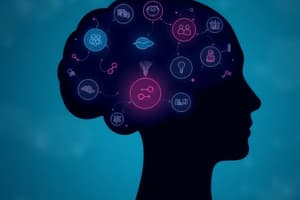Podcast
Questions and Answers
What is the primary reason people engage in risk-seeking behavior when facing potential losses?
What is the primary reason people engage in risk-seeking behavior when facing potential losses?
Which of the following best describes optimism bias?
Which of the following best describes optimism bias?
How do most people tend to prioritize gains and losses when making decisions?
How do most people tend to prioritize gains and losses when making decisions?
What phenomenon describes the greater emotional impact of losses as opposed to gains?
What phenomenon describes the greater emotional impact of losses as opposed to gains?
Signup and view all the answers
In decision-making, people are more likely to focus on which of the following?
In decision-making, people are more likely to focus on which of the following?
Signup and view all the answers
Why might individuals display risk-seeking behavior when attempting to recover from a loss?
Why might individuals display risk-seeking behavior when attempting to recover from a loss?
Signup and view all the answers
What psychological bias do people exhibit when they believe their chances of experiencing negative outcomes are lower than they actually are?
What psychological bias do people exhibit when they believe their chances of experiencing negative outcomes are lower than they actually are?
Signup and view all the answers
Which of the following statements best reflects a common misconception about risk-taking behavior?
Which of the following statements best reflects a common misconception about risk-taking behavior?
Signup and view all the answers
How does the phenomenon of loss aversion impact decision-making in economic contexts?
How does the phenomenon of loss aversion impact decision-making in economic contexts?
Signup and view all the answers
Which statement accurately describes exemplar theory?
Which statement accurately describes exemplar theory?
Signup and view all the answers
What is the primary limitation of relying on the representativeness heuristic?
What is the primary limitation of relying on the representativeness heuristic?
Signup and view all the answers
In what way do framing effects influence decision-making?
In what way do framing effects influence decision-making?
Signup and view all the answers
What does the availability bias primarily rely on?
What does the availability bias primarily rely on?
Signup and view all the answers
What is the effect of loss aversion on people's behavior when facing potential losses?
What is the effect of loss aversion on people's behavior when facing potential losses?
Signup and view all the answers
How does optimism bias impact individuals' perception of risk?
How does optimism bias impact individuals' perception of risk?
Signup and view all the answers
How do people typically behave with probabilities related to risk?
How do people typically behave with probabilities related to risk?
Signup and view all the answers
Which of the following best illustrates the conjunction fallacy?
Which of the following best illustrates the conjunction fallacy?
Signup and view all the answers
What distinguishes exemplar theory from prototype theory in categorization?
What distinguishes exemplar theory from prototype theory in categorization?
Signup and view all the answers
What is the primary reason for the occurrence of the conjunction fallacy?
What is the primary reason for the occurrence of the conjunction fallacy?
Signup and view all the answers
What role do concepts play in categorization?
What role do concepts play in categorization?
Signup and view all the answers
What psychological bias occurs when people assess the likelihood of an event based on how easily they can recall examples?
What psychological bias occurs when people assess the likelihood of an event based on how easily they can recall examples?
Signup and view all the answers
Which statement best summarizes prospect theory's primary focus?
Which statement best summarizes prospect theory's primary focus?
Signup and view all the answers
What is a key difference between prototype theory and exemplar theory?
What is a key difference between prototype theory and exemplar theory?
Signup and view all the answers
In decision-making, how do framing effects influence people's judgments?
In decision-making, how do framing effects influence people's judgments?
Signup and view all the answers
How do people typically interpret probabilities when making decisions?
How do people typically interpret probabilities when making decisions?
Signup and view all the answers
What characteristic of human thinking explains the frequent misjudgments about rare events?
What characteristic of human thinking explains the frequent misjudgments about rare events?
Signup and view all the answers
What might individuals focus on more due to loss aversion when faced with a potential gain?
What might individuals focus on more due to loss aversion when faced with a potential gain?
Signup and view all the answers
How do the concepts of prototype and exemplar theory enhance understanding of category judgment?
How do the concepts of prototype and exemplar theory enhance understanding of category judgment?
Signup and view all the answers
Study Notes
Concepts and Categorization
- Concepts are mental representations categorizing related objects, events, or stimuli.
- A prototype is the typical example of a category, used for comparison.
- Exemplar theory categorizes new stimuli by comparing them to specific known examples.
- Prototype theory compares new items to an idealized average.
- Exemplar theory allows more flexibility, using multiple stored examples.
Cognitive Biases and Heuristics
- Availability bias: Judging frequency based on ease of recall. Familiar events seem more common.
- Conjunction fallacy: Believing specific conditions are more probable than a general one.
- Representativeness heuristic: Judging probability based on similarity to a prototype, neglecting base rates.
- Framing effects: Decisions influenced by how information is presented.
- Loss aversion: Greater emotional impact from losses than gains, leading to riskier choices to avoid losses.
Probability and Decision Making
- Probability estimates the likelihood of an event, guiding decisions.
- Humans struggle with interpreting probabilities accurately, favoring heuristics and biases.
- People often overestimate rare events and underestimate common ones.
- Optimism bias: Overestimating positive outcomes and underestimating negative ones, leading to a favorable view of personal risk.
Studying That Suits You
Use AI to generate personalized quizzes and flashcards to suit your learning preferences.
Description
Explore the key concepts of cognitive psychology, including categorization, cognitive biases, and decision-making heuristics. This quiz focuses on prototypes, exemplars, and various cognitive biases like availability and loss aversion, providing insight into how we process information and make choices.




